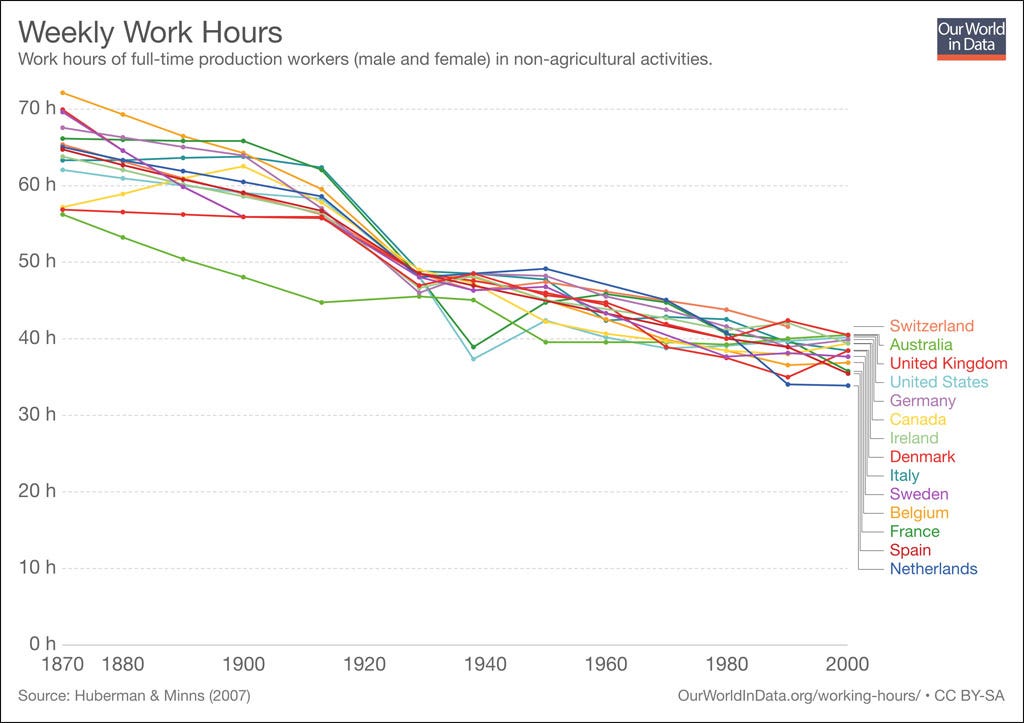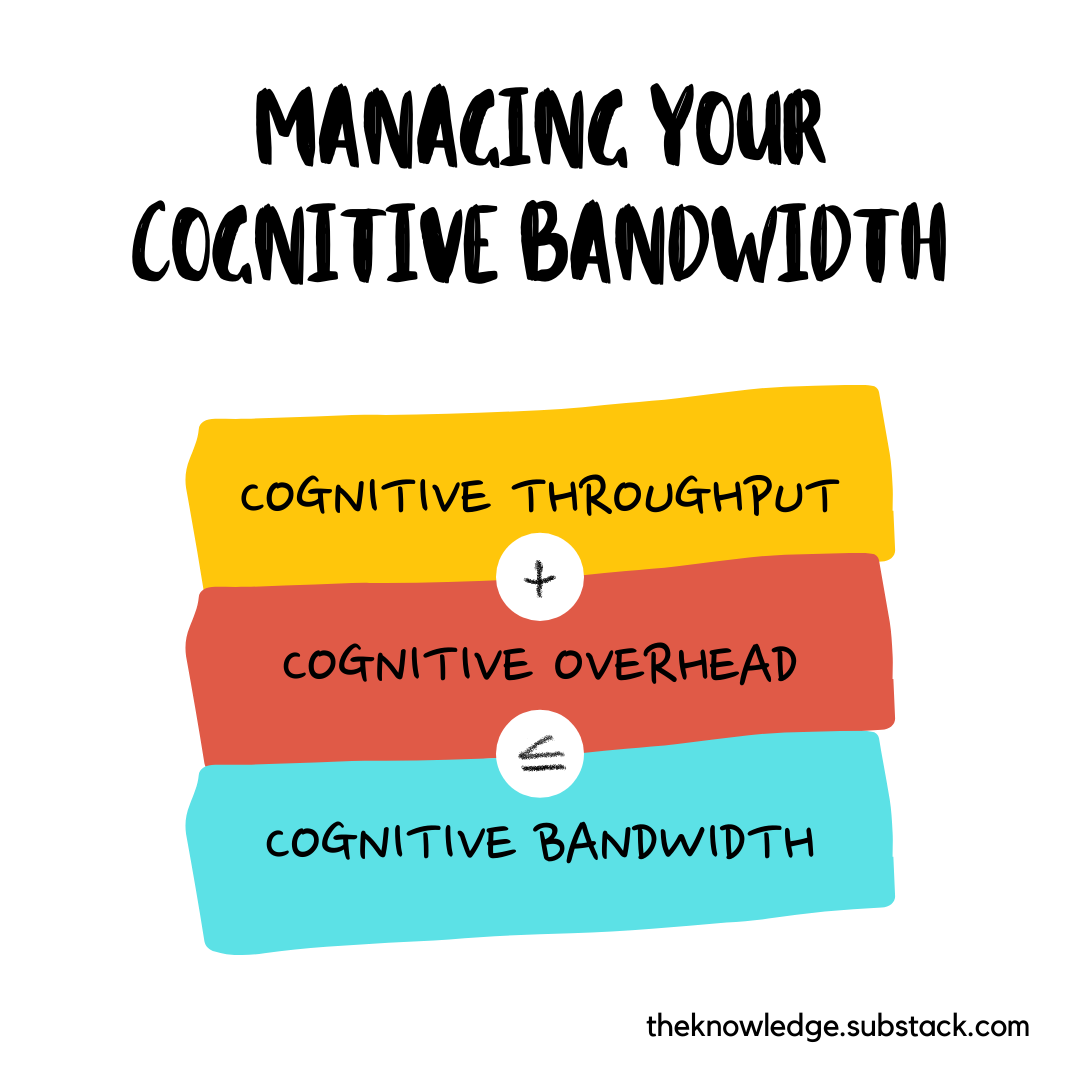Working hard but hardly working
I’ve been struck by the paradox that many of us feel busy—as busy as we’ve ever been—but technically humans are the least busy they’ve been in centuries.

What has actually changed is the number of choices available to us. In a previous life you might be born to a baker, and you’d be the baker’s apprentice, so you’d work 12 hours that day and go to bed. There was no need to aspire much further. In many ways life was far less complex. We now have so many options that every choice seems to ripple through your life and drastically change your fortunes and future opportunities.
We work less hours each day than any humans that have ever lived and yet we are obsessed with finding solace in tomorrow, and making choices today that might reflect a better future.
The knowledge that we have a near-infinite number of things we can do results in the idea that we must try all the things, or at least fill our days with as many of the most pleasurable and fulfilling things as possible. When the option exists to fill your day with more than just work, or at least more than just one type of work, time suddenly feels scarce.
Cognitive bandwidth
Perceived time scarcity has a drastic impact on cognitive bandwidth, and the mental room we have available for productive decision-making:
“This scarcity mindset consumes what Shafir calls ‘mental bandwidth’ — brainpower that would otherwise go to less pressing concerns, planning ahead and problem-solving. This deprivation can lead to a life absorbed by preoccupations that impose ongoing cognitive deficits and reinforce self-defeating actions…When you focus heavily on one thing, there is just less mind to devote to other things. We call it tunneling — as you devote more and more to dealing with scarcity you have less and less for other things in your life.” — American Psychological Association
It’s something I touched on in an old podcast episode about the viability of UBI. When you have to devote precious mental resources to dealing with scarcity, you have little brainpower left to climb Maslow’s hierarchy of needs and achieve self-actualization.
Here’s a quick equation to help make sense of it:

- Throughput: Thinking done per unit of time—this depends on the complexity of what you are working on.
- Overhead: The mental awareness and monitoring cost of organization, planning, etc.”
- Bandwidth: Your total perceived mental bandwidth—this is often fixed although it can be optimised.
The idea is that improving performance requires:
- An understanding of your personal mental bandwidth—this is individual to you but you need to know your limits and capabilities in order to navigate them effectively.
- Ensuring that the cumulative workload of active tasks and concurrent monitoring do not exceed those limits.
For computer nerds another analogy is knowing your CPU clock-speed, the amount of active memory each program requires, and being aware of the RAM you have available to switch tasks effectively. To simplify, you can probably appreciate that if you only have a web browser open, you could still keep your word document open in the background and have no issues switching between them. But if you were rendering 4K video in an intensive editing session and wanted to watch a movie at the same time, your performance might suffer.
Likewise, If your cognitive throughput and overhead exceed your current total bandwidth, your performance on each task will begin to deteriorate and the penalty for switching/monitoring tasks will increase.
An important caveat is that not all tasks are equal. The issue is that different tasks (throughput) require different amounts of mental energy to execute optimally (overhead). It’s not to say you can’t do many things at once, but that you should be careful with the type of tasks you juggle and be aware of the mental penalty of balancing them.✓
Choice overload
The issue of choice overload extends beyond work and into our daily lives.
The explosion of available goods has only made time feel more crunched, as the struggle to choose what to buy or watch or eat or do raises the opportunity cost of leisure (ie, choosing one thing comes at the expense of choosing another) and contributes to feelings of stress. The endless possibilities afforded by a simple internet connection boggle the mind. When there are so many ways to fill one’s time, it is only natural to crave more of it.” — The Economist
In Greg McKeown’s book about Essentialism which I recently wrote about, he emphasizes that “Our options may be things, but a choice—a choice is an action”. A choice isn’t just something to be made, it is a positive expression of action and the result of deliberation. You could also choose to not choose. Reverting to the infamous trolley problem where you’re asked to choose between allowing five people to die on one track or killing one on another track by flipping the switch, there is always the choice to kill yourself or leave—to refuse to play the game. Choosing is a choice.
This is an interesting paradigm flip for me—considering each choice as positive action fits with what we understand about decision fatigue, i.e. that the more decisions you need to make, the more your ability to make decisions will deteriorate.
What we are really striving for is more options with less choice. And the reason we want options is to pursue a greater sense of happiness and fulfillment.
I’ve decided to make this a three-part series. Tune in next week for thoughts on Mo Gowdat’s happiness equation, and then we’ll consider Ikigai, or “the purpose of living” and my extension of Kyle Kowalski’s thoughts on how to develop on the model.
If you have any other super tips for staying true to the essential and prioritising value, I’d love to hear your thoughts. Reply via email, leave a comment or send me a tweet!

Reading list
Books I’ve read/seen/will impulsively buy and add to my “to read” shelf on Goodreads. Recommendations from newsletter readers are always welcome:
- Rebel Ideas: The Power of Diverse Thinking by Matthew Syed - impulsively bought. At this point I’ve read/bought a few of his books and enjoy his ideas enough that I’ll continue to buy them just to see what he has to say.
- Stay with Me by Ayobami Adebayo - read. A really compelling read. I finished this in a single sitting and would happily recommend.
- Small Island by Andrea Levy - impulsively bought. This was recommended by a newsletter reader and I can’t wait to dig in.
Things I’m loving
Films and shows:
- Terrace House - within a few episodes this instantly became my new favourite show. It’s in Japanese though, so if you don’t have the patience to read subtitles, grow up (or learn Japanese) x
- Warrior Nun - I’m admittedly conflicted on this. The premise is awesome and very reminiscent of the Book of the Ancestor series which I recently started, finished, and loved. However, the protagonist is extremely unlikeable and the plot torpedos violently in the last few episodes. I’m not sure anyone really thought through the magic system properly, and if they did, they definitely didn’t want to share that knowledge with the rest of us.
Resources:
- Window Swap lets you stare out of other people’s windows around the world and see what they see. It’s pretty awesome, especially for anyone still stuck indoors.
- Setapp is a cool subscription service I came across for Mac apps which lets you access +180 apps through a single subscription.
- I’ve been combining Audible and Kindle Unlimited to maximise my time and read a lot more and I’m loving it. Use those links for a free book and 30-day trial with Audible or 60-day free trial of Kindle Unlimited.
Let me know if you have any suggestions for next week. Feedback is welcome too! Email me or drop me a tweet here.
Until next time!!







